-
No-Code
Platform
-
Studio
No-code agentic platform delivering the fastest time-to-value and the highest ROI
-
Studio
-
AI-Native CRM
CRM
-
AI-Native CRM
New era CRM to manage customer & operational workflows
CRM Products -
AI-Native CRM
- Industries
- Customers
- Partners
- About
AI Agents in the Financial Industry: Use Cases, Business Benefits & Opportunities
Updated on
September 26, 2025
13 min read
Transform Business Ops with Creatio’s AI Agents for FinServ

The financial sector continues to lead the adoption of advanced AI technologies, which assist financial professionals across a range of processes like fraud detection and risk assessment, decision-making and forecasting – and their growing use is reflected in market trends. According to Markets and Markets, the global AI in finance market is projected to grow from $38.36 billion in 2024 to an impressive $190.33 billion by 2030.
One of the key contributors to this growth is the rise of AI agents – intelligent, autonomous systems that process vast volumes of financial data, learn from patterns, and make complex decisions with minimal human intervention. For financial institutions, these agents enable a shift from reactive analysis to proactive, real-time actions that unlock efficiency at scale without increasing overhead.
This article explores the evolving role of AI agents in the financial industry: what they are, how they work, and what business value they can create. We’ll also look at the common use cases of AI agents in finance, critical considerations for adoption, and how an AI-native system enables teams to embed intelligence into day-to-day financial operations.
What are AI Agents in Finance?
AI agents for finance are autonomous systems that use artificial intelligence (AI) to perform complex financial tasks with minimal human input. Powered by technologies like natural language processing (NLP), machine learning, and advanced analytics, they help automate and streamline operations in finance, making them faster, more accurate, and easier to scale.
Unlike Generative AI systems, which passively respond to user requests, AI agents are goal-oriented: they continuously learn from data, adapt to new patterns, and act based on context. Think of them as proactive digital assistants for finance teams, which can understand instructions, analyze vast datasets, make decisions, and independently execute routine and complex tasks.
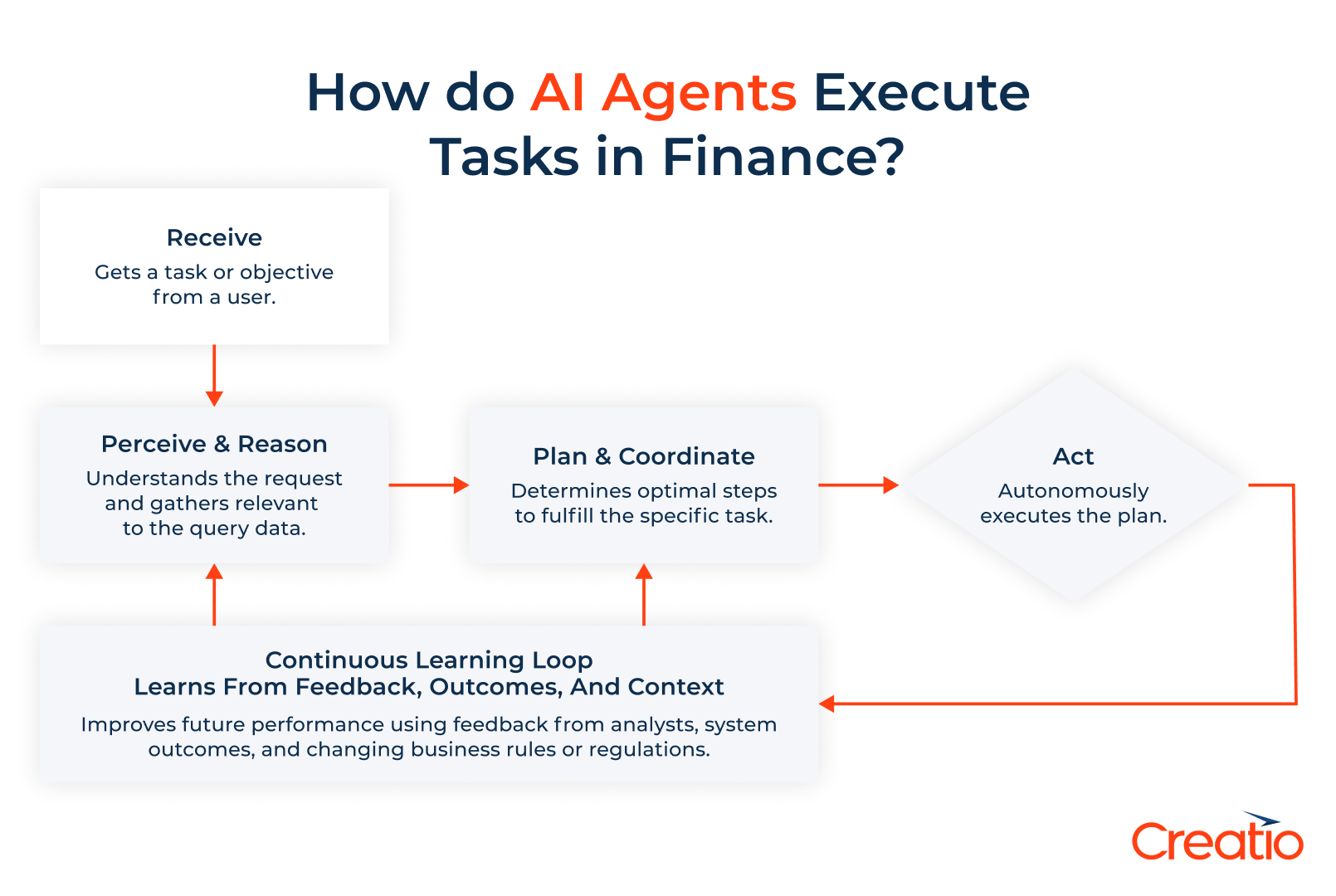
Financial institutions commonly use AI agents to handle data-heavy processes and support real-time decision-making. For example, finance AI agents can:
- Flag suspicious transactions in loan applications
- Assess credit risk based on historical and market data
- Generate regulatory compliance reports
- Deliver tailored financial insights based on real-time analysis
AI agents can work independently or interact through intuitive interfaces, helping finance teams work more efficiently, minimize human errors, and stay focused on more strategic tasks. As adoption increases, AI agents will take on an even broader role in finance, from supporting individual investors and finance teams to driving innovation across the industry.
The State of AI Agents & No-Code: FinServ Edition
Learn how financial leaders use AI agents and no-code to fuel smarter transformation
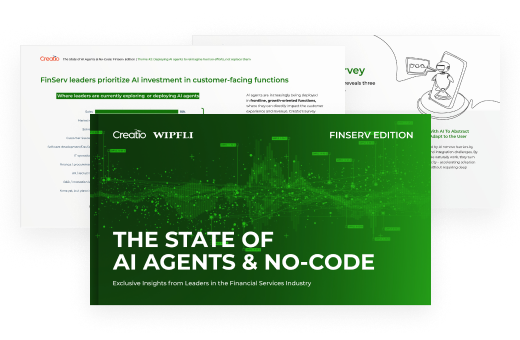
Key Benefits of AI Agents for the Financial Industry
AI agents offer multiple benefits for financial institutions seeking to modernize operations, reduce costs, and improve customer engagement. Below, we have covered the most valuable benefits of these systems for the financial landscape.
Enhanced Operations at Scale
One of the biggest advantages of AI agents is the ability to automate routine, time-consuming workflows. For instance, AI can autonomously handle tasks like data entry, validation, compliance checks, reporting, and other repetitive workflows that would typically require manual effort. This allows financial institutions to scale operations more efficiently, without increasing costs or growing team size.
Automation also reduces the risk of human error, keeping day-to-day operations running more smoothly. With less time spent on repetitive tasks, finance professionals can shift their focus to higher-value work, such as advising clients or developing new financial strategies.
Smarter, Autonomous Decision-Making
AI agents bring speed and structure to data analysis by processing vast amounts of structured and unstructured data in real time, surfacing valuable insights in context. This empowers finance professionals to set up an AI decision-making process that is not just faster but also contributes to impressive outcomes.
For example, BlackRock uses custom-built AI to support its investment strategy, analyzing market trends, sentiment, and other financial data to identify actionable investment opportunities. These AI systems allow for enhancing portfolio decisions that would be impossible at the human scale and speed.
Robust Risk Management
Risk management has always been an integral component of the finance industry. Financial AI agents strengthen risk management by continuously monitoring anomalies, detecting suspicious patterns, and flagging threats before they escalate. These systems operate in real time, helping financial institutions catch fraud early, assess risk more accurately, and reduce exposure across critical operations.
Additionally, the ability of AI agents to learn from evolving data and scale across systems allows for keeping detection systems more accurate and resistant to evolving fraud tactics.
Personalized Customer Experience
AI agents enable faster, more personalized service at scale, strengthening relationships between financial institutions and their customers. By analyzing customer goals and financial data, these systems can deliver tailored recommendations that match the client’s needs. They also provide proactive support and 24/7 availability through digital self-service tools, which allow for automating routine processes like budgeting, spending insights, and personalized financial guidance.
Stronger Regulatory Compliance and Security
As financial regulations evolve, staying compliant with new and updated policies is a constant challenge for institutions. AI agents don’t just help teams meet regulatory requirements but embed regulatory compliance directly into everyday workflows.
For example, these AI agents can:
- Detect suspicious activity tied to money laundering or fraud
- Consistently update rules as policies evolve
- Generate audit-ready reports to streamline regulatory reporting
- Apply compliance rules consistently across systems, teams, and workflows
By turning compliance into a continuous, automated process, financial institutions reduce human error, ease audit pressure, and stay aligned with constantly evolving regulatory standards.
Increased Revenue & Cost Optimization
By automating routine processes and workflows, AI agents can effectively address inefficiencies and unlock new revenue opportunities. By automating data-intensive tasks, such as underwriting, compliance reporting, and customer onboarding, these systems can optimize employee workload and reduce error-related expenses.
According to a recent survey by NVIDIA, over 60% of organizations reported that AI helped reduce annual costs by 5% or more – a clear sign of its bottom-line impact.
On the revenue side, AI-driven insights enable smarter cross-selling, more accurate pricing models, and better personalized product offers. By analyzing customer data and behavioral signals, AI agents can recommend the right product at the right time, boosting conversion rates with minimal manual input.
Based on the recent report “AI in Financial Services” by World Economic Forum, 70% of financial services executives believe that AI will directly tie to revenue growth in the upcoming years.
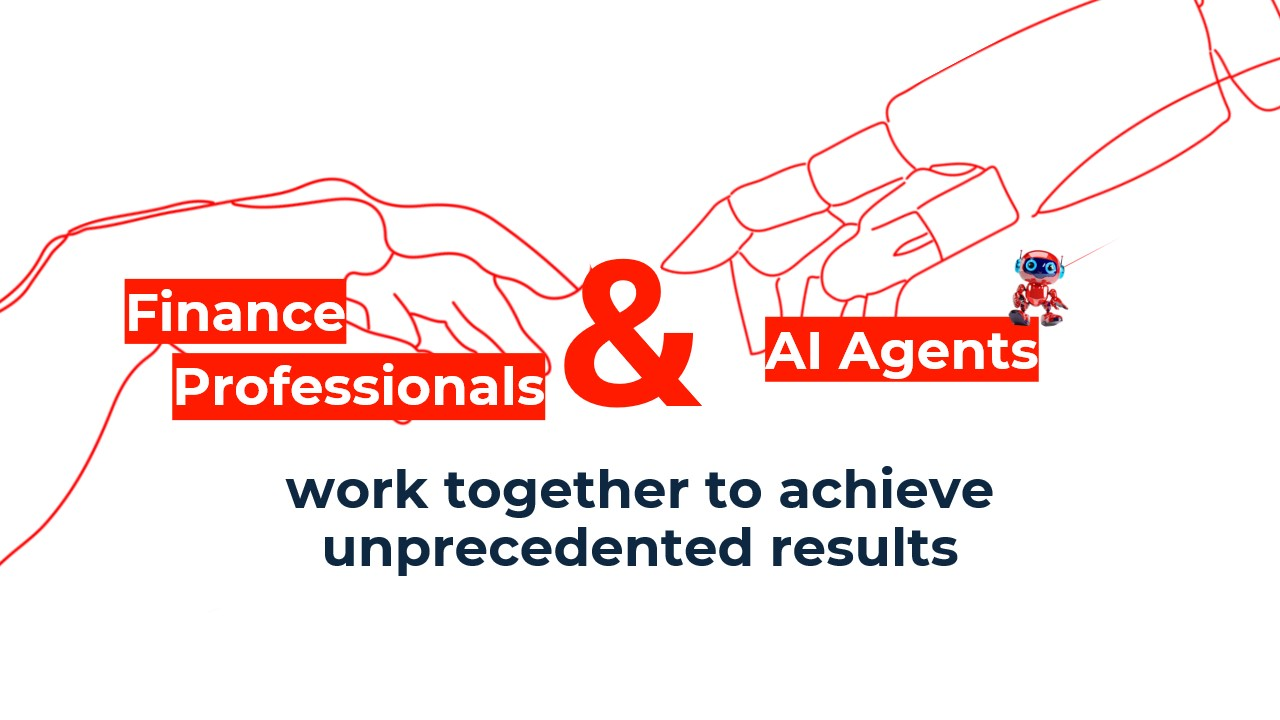
Most Impactful Use Cases of AI Agents in Financial Services
In 2023, financial services companies invested over $35 billion in AI – and this number is projected to reach $97 billion by 2027, particularly across the core industry segments such as banking, insurance, and credit unions. A growing share of that investment is now directed toward AI agents, as institutions apply them across critical, high-impact workflows.
Here are the most common cases of how these AI systems power up financial services today:
#1. Credit Assessment & Loan Origination
AI agents significantly improve the manual, document-heavy workflows that slow down credit evaluation and loan origination. They can automate key steps such as gathering applicant data, verifying documents, and performing real-time risk assessments, all while ensuring process consistency and accuracy.
For instance, instead of manually reviewing every case, credit teams now rely on AI to manage routine assessments, freeing them up to focus on complex cases or high-value clients.
#2. Compliance & Customer Onboarding
Customer onboarding in finance is a compliance-intensive process that requires speed, accuracy, and alignment with evolving financial regulations. AI agents help meet all three by automating identity verification (KYC), scanning documents, and cross-checking customer data against AML watchlists and policy rules in real time.
By streamlining these business operations with AI, compliance teams can focus their attention only where it’s needed most – on flagged exceptions or unusual risk indicators. This enables companies to reduce onboarding time, efficiently scale the workflow, and perform tasks with full regulatory alignment and a smooth customer experience.
#3. Fraud Detection and Prevention
AI agents power the financial industry in preventing fraud by continuously monitoring transactions, user behavior, and system activity in real time. These systems can identify suspicious patterns, like unusual spending, login anomalies, or suspicious credentials, more efficiently than traditional AI and rule-based engines.
For instance, here’s a real-world example: when AI agents detect suspicious activity – like login anomalies or suspicious spending patterns – they can trigger additional verification or pause the transaction to review by human analysts. This real-time monitoring helps prevent losses and strengthen customer trust.
#4. Customer Experience and Engagement
AI agents are helping financial institutions personalize customer interactions on scale by making financial services more responsive, personalized, and available 24/7. For example, AI-powered digital assistants help customers open new accounts, track financial goals, and get product recommendations aligned with their income, spending patterns, or risk profiles.
In sales and marketing aspects, AI agents analyze customer behavior to identify upsell opportunities. The real-world examples include suggesting a premium credit card to a customer with growing transaction volume or recommending a mortgage refinance based on market changes. They also score leads, tailor outreach, and automate follow-ups, enabling financial teams to engage clients more effectively and prioritize high-value conversations.
#5. Risk-Based Pricing & Underwriting
By analyzing vast amounts of risk-related data, such as credit history, market trends, behavioral patterns, and others, AI agents can enhance pricing precision and underwriting efficiency. They can automatically calculate risk scores, recommend pricing tiers, and flag anomalies for human analysts to review.
Underwriting teams can also use AI-driven insights to make fast and more consistent decisions. For instance, AI agents can highlight risk indicators missed by a human underwriter or analyze how different pricing strategies affect profitability. This leads to quicker approvals, fairer pricing, and stronger alignment with each customer’s risk profile.
#6. Trading and Portfolio Optimization
Another great example of how AI agents can be used in the financial sector is their ability to enhance the workflows of trading teams and portfolio managers. By analyzing real-time market volatility, news, and economic indicators, these systems can flag emerging risks, identify opportunities, and recommend portfolio adjustments on the fly.
In particular, AI agents support trading desks by analyzing earnings reports, market volatility shifts, and other data to surface actionable insights. Human portfolio managers can then adjust strategies based on the AI-driven recommendations, or let agents execute trades within pre-set parameters.
#7. Automated Compliance Processes
Beyond onboarding, AI agents support day-to-day compliance by monitoring transactions, enforcing rules across departments, and validating documentation in real time. This reduces audit risk and allows teams to focus on higher-level governance.
For example, agents can track suspicious patterns tied to anti-money laundering (AML) activity, confirm that documentation meets evolving regulatory standards, or auto-generate regulatory reports to ensure alignment with regulations in the financial industry.
The State of AI Agents & No-Code
Learn how 560+ leaders across the world use AI and no-code to drive innovation today
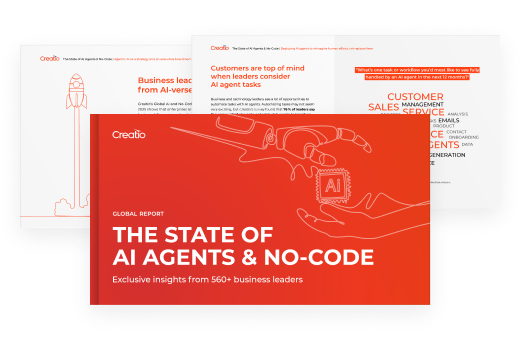
Major Challenges of Integrating AI Agents
Like any emerging technology, integrating AI agents comes with its own set of challenges.. Some early barriers, such as limited budgets, are gradually fading, with 50% fewer organizations reporting financial constraints (according to Nvidia’s “State of AI in Financial Services” report). But as AI adoption moves from experimentation to large-scale implementation, new challenges can arise.
Here are the most notable challenges to consider for AI agents’ adoption in the financial services industry today:
- Data Privacy and Security. In the financial services industry, AI agents operate on highly sensitive customer, regulatory and transaction data. Ensuring that these systems meet strict privacy laws, cybersecurity standards, and compliance frameworks (like GDPR or PCI DSS) is a constant, non-optional challenge.
- Data Quality and Accessibility. Siloed, incomplete, or inconsistent data limits AI accuracy, especially in critical areas like lending, fraud detection, and asset management.
- Integration with Legacy Systems. Many financial institutions still rely on decades-old infrastructure. Connecting AI agents to core financial tools and systems, CRMs, and compliance platforms without breaking existing workflows is both a technical and strategic challenge for modern organizations.
- Oversight and Human-in-the-Loop Design. In highly regulated environments like financial services, AI agents must operate under human supervision. Defining the right balance between autonomous decision-making and manual control is essential for trust, accountability, and compliance.
- Regulatory and Compliance Complexity. Similar to other technologies for finance, AI agents must be explainable and auditable. Keeping up with changing global and regional regulations adds complexity to the AI deployment and scaling.
- Lack of AI literacy. Limited internal expertise can slow the adoption of AI agents for financial services. Building AI literacy across business and technical teams is key to unlocking its long-term value.
As these challenges show, adopting AI agents in finance takes more than just advanced technologies – it requires a clear, strategic approach tailored to your unique business goals and needs.
To help you lead this transformation, we’ve created the No-Code Playbook: Age of AI (2nd Edition) – a 200-page, vendor-agnostic guide designed to help teams build and scale complex business applications with no-code. This new edition is enhanced for the AI era, showing how to scale no-code success with AI agents, automation, powerful tools and development approaches. It also uncovers fresh insights, updated frameworks, and expanded insights, and practical recommendations to help businesses harness the power of AI while keeping humans in control.
No-code Playbook
Discover how to build complex business applications effortlessly—grab your free 200-page No-Code Playbook now!

What’s the Future of Artificial Intelligence in Finance?
Looking ahead, AI will only grow more central to the financial services industry. As adoption scales and technologies mature, current limitations, such as data silos, processing bottlenecks, or narrow AI use cases, will be resolved with more intelligent, flexible, and industry-focused systems.
According to the World Economic Forum’s report on Artificial Intelligence in Financial Services, the future financial trends will include:
- Maturation of AI Agents. AI agents in finance will evolve from task-specific assistants to autonomous, multi-functional systems that can handle complex tasks end-to-end. Future AI agents will be applied to a broader range of problems and decision-making opportunities, entirely transforming finance services.
- Small language models (SLMs). Unlike large general-purpose models, SLMs are designed for high efficiency and task-specific accuracy. In the financial sector, these intelligent systems will perform domain-specific, repetitive tasks like responding to customer inquiries about particular financial products or policies faster and with fewer resources than traditional LLMs.
- Retrieval-augmented generation (RAG). This technology enhances generative AI with access to real-time, relevant information from a knowledge base, database, or other external sources, thus directly improving the accuracy and trustworthiness of AI responses. This technology can be particularly important for AI agents in finance, helping to reduce hallucinations and improving compliance.
- Quantum Computing. The fusion of quantum computing with AI holds enormous potential for the financial services industry, particularly in areas that rely on complex pattern recognition. As the technology matures, financial institutions will be able to accelerate traditional problem-solving workflows: for example, detecting fraud across vast volumes of transaction data, improving credit risk modeling, optimizing asset allocation, and more.
- Responsible AI. With the expansion of AI in high-stakes industries like finance, responsible AI practices will be essential not just for efficiency but to ensure transparency, fairness, and regulatory alignment across all AI-driven operations.
Creatio AI for Finance: Enhance Your Unique Operations with AI-Powered Automation
AI adoption in financial services often starts with a mix of specialized tools – one for fraud detection, another for customer service, a separate solution for compliance, onboarding, reporting, and so on. But as AI use cases expand, this fragmented approach leads to rising costs, duplicate efforts, and disconnected teams.
To implement AI agents effectively – at scale, with speed, and without extensive coding – financial institutions need a comprehensive, AI-native solution that supports their unique business workflows. That’s where Creatio comes in.
Creatio is a unified no-code platform that enables financial organizations to automate business workflows and CRM with advanced AI capabilities. Unlike other financial service tools, Creatio enables users to orchestrate end-to-end workflows across front-, middle-, and back-office use-cases, eliminating fragmentation and driving seamless collaboration across business teams.
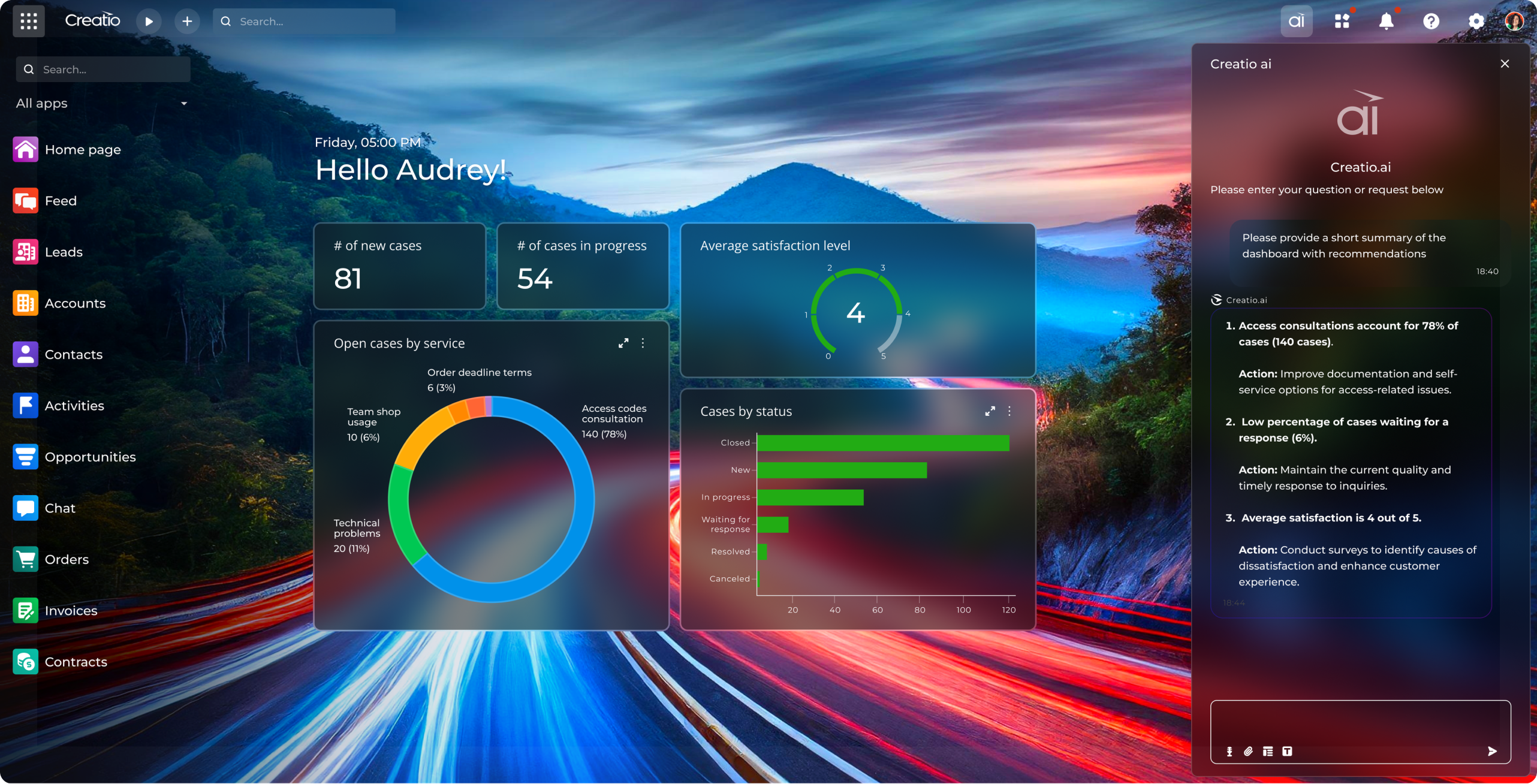
It allows financial organizations to design, launch, and manage FinServ AI agents from a single environment, powering a full range of use cases, from credit scoring, customer onboarding, and service requests to underwriting, fraud prevention, KYC/AML compliance, and more. With composable architecture and no-code agility, Creatio helps financial teams implement and scale AI across key business workflows — faster, smarter, and with full control.
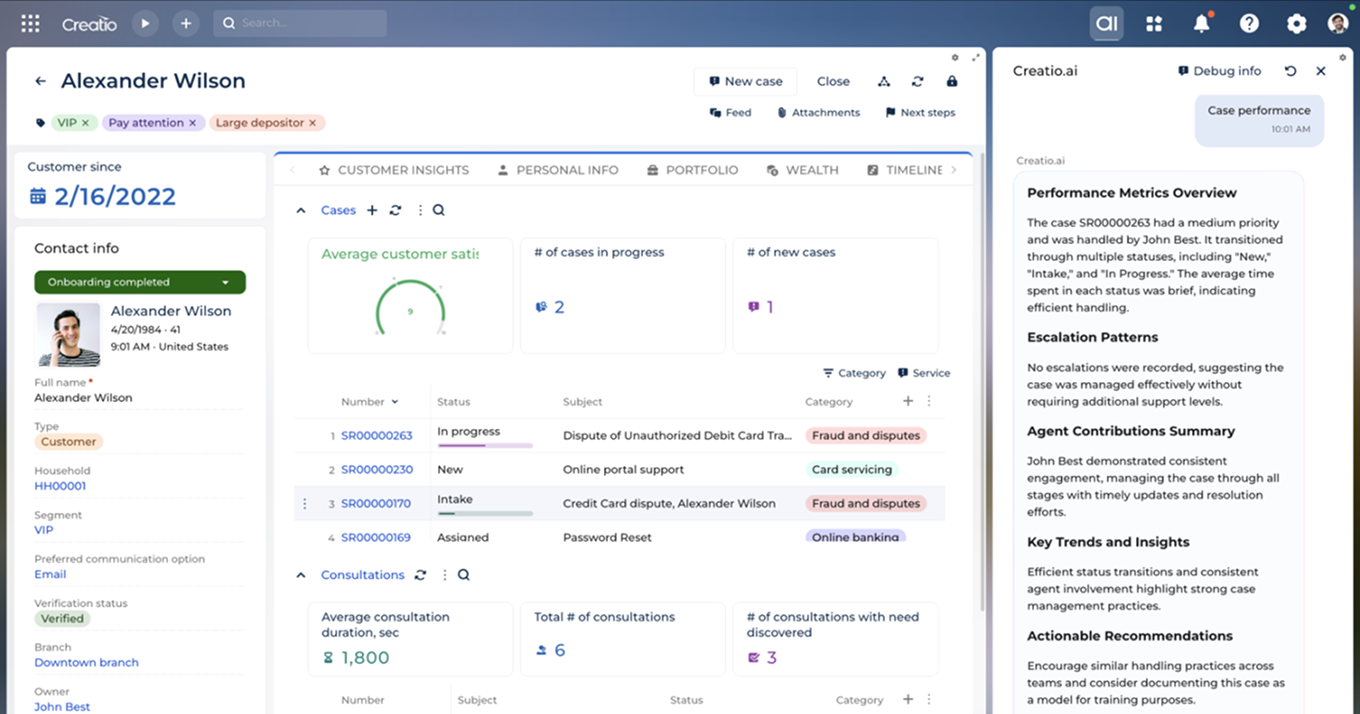
The platform also offers access to over 700 third-party applications, pre-built integrations, and connectors available via Creatio Marketplace, which enable teams to adapt its capabilities to the specific needs of any financial organization.
With Creatio AI, finance teams can:
- Design and launch AI agents for specific financial workflows using powerful no-code tools without deep technical expertise.
- Make real-time decisions on credit, risk, compliance, and operations with AI-native, context-aware agents.
- Continuously analyze structured and unstructured data to uncover valuable insights and patterns in real-time.
- Autonomously execute routine and complex tasks like updating records, generating reports, adjusting exposures, and more.
- Seamlessly integrate AI agents across other platforms to ensure efficient team workflows at scale.
At Creatio, financial professionals and AI agents work together, merging human talent with AI-driven decision-making and execution to unlock new levels of operational performance. Thanks to a flexible “human-in-the-loop” model, teams can control how much autonomy each AI agent has, ensuring the ideal balance between automation and oversight across different processes and scenarios.
Creatio offers a library of prebuilt AI Skills that can be customized to fit specific tasks, financial tools, and business goals. Financial AI agents can actively monitor workflows, surface real-time insights, suggest next-best actions, and integrate directly with various productivity tools like Outlook, Teams, Zoom, and calendars. And with intuitive no-code tools, users can embed AI agents into existing processes or build entirely new autonomous workflows that align with business objectives and needs. With built-in generative, agentic, and predictive AI capabilities – and the freedom to create custom AI Agents for specific financial workflows Creatio helps teams act faster, work smarter, and drive measurable business outcomes.






















































